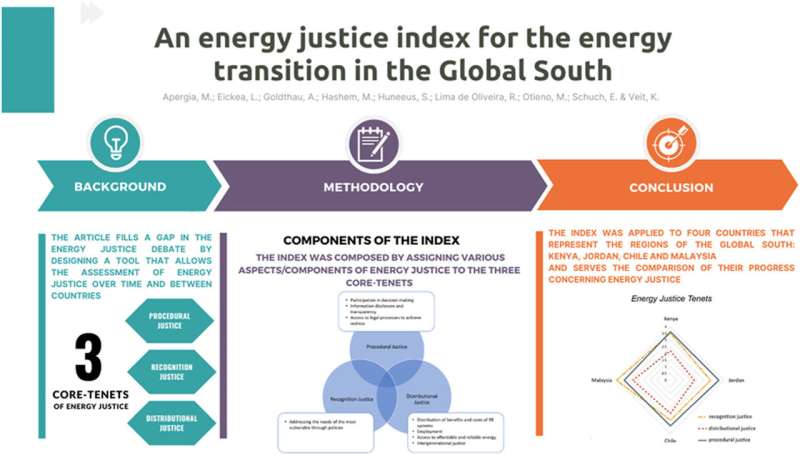This article has been reviewed according to Science X's editorial process and policies. Editors have highlighted the following attributes while ensuring the content's credibility:
fact-checked
proofread
New energy justice index casts spotlight on energy transition in the Global South

Can the transition to a zero-carbon society in the Global South propel sustainable development? A team led by scientists from the Research Institute for Sustainability (RIFS) has developed the first quantitative approach to measure the extent to which energy transitions in the Global South incorporate elements of energy justice.
The study "An energy justice index for the energy transition in the Global South," prepared by lead author Maria Apergi and a team of researchers, allows for a standardized, quantitative comparison of the transition processes of different countries. The study is published in Renewable and Sustainable Energy Reviews .
A quantitative measure of the extent to which energy transitions in countries outside the Global North live up to the imperative of energy justice has been lacking to date. The index presented in the journal Renewable and Sustainable Energy Reviews addresses this deficit.
The concept of energy justice
Energy justice is a concept that engages with the fairness of energy systems, taking into account the social and development implications of energy technologies, policies, and projects.
A large share of the relevant studies on energy justice published to date focused on assessing the justice implications of low-carbon transitions and renewable energy. The newly-developed index provides an analytical framework for identifying injustices in energy processes and putting forward solutions.
The index was composed by assigning various components of energy justice to the three core tenets of Procedural Justice, Recognition Justice, and Distributional Justice.
The authors emphasize that the ranking of the countries covered does not always correspond to the level of their economic development. Malaysia and Chile, for example, scored higher in terms of distributional justice, while Kenya and Jordan scored higher in terms of procedural justice. Kenya also scored higher in terms of intergenerational justice and distribution of costs and benefits of renewable energy infrastructure.
Implications for climate policy
The researchers recommend that national governments and transnational players such as multilateral institutions and investors work towards the establishment of policy frameworks and strategies that systematically integrate justice concerns. This concerns regulations addressing due process in the design of energy systems as well as access, affordability, and other distributional considerations.
Policies to advance recognition justice through rural electrification programs and microfinancing, for example, are also indispensable in the protection of vulnerable groups, the authors note.
Economic instruments that encourage investment in renewable energies should also include social criteria. In addition, policymakers could benefit from introducing monitoring, reporting and data verification procedures for energy justice related indicators, so as to improve data quality and availability.
The index presented in the study will contribute to the discussion on energy justice and facilitate assessments of energy justice over time and between countries.
The results illustrate the multi-dimensionality and complexity of the energy justice concept, especially when it is applied to the energy transition.
Underpinned by a wealth of data and made accessible online, the index can become a valuable tool for researchers and decision-makers in their efforts to systematically study and improve energy justice—in the Global South and beyond.
More information: Maria Apergi et al, An energy justice index for the energy transition in the global South, Renewable and Sustainable Energy Reviews (2023). DOI: 10.1016/j.rser.2023.114238
Provided by Forschungsinstitut für Nachhaltigkeit Helmholtz-Zentrum Potsdam





















